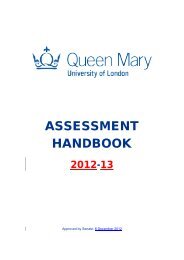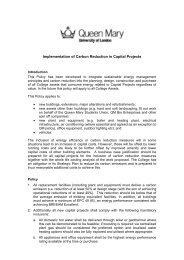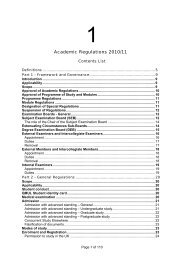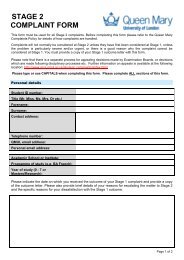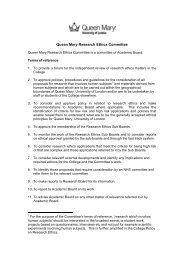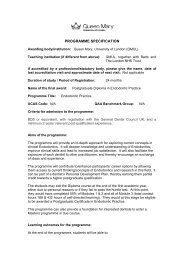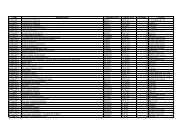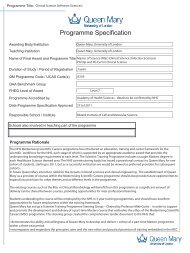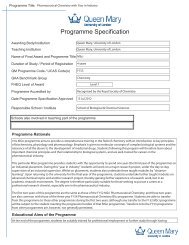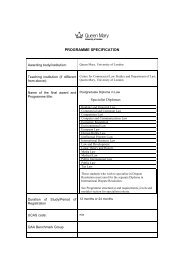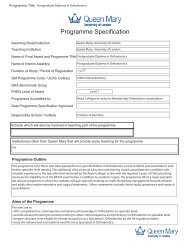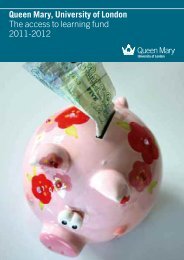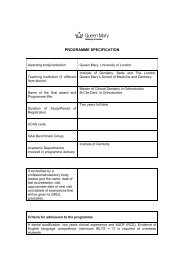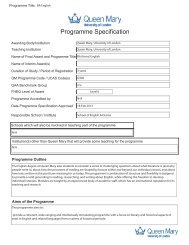Postgraduate Diploma in Healthcare Research Methods (B2D3, B2D4)
Postgraduate Diploma in Healthcare Research Methods (B2D3, B2D4)
Postgraduate Diploma in Healthcare Research Methods (B2D3, B2D4)
You also want an ePaper? Increase the reach of your titles
YUMPU automatically turns print PDFs into web optimized ePapers that Google loves.
Programme Title: Distance Learn<strong>in</strong>g PGDip/MSc <strong>in</strong> <strong>Healthcare</strong> <strong>Research</strong> <strong>Methods</strong><br />
Programme Specification<br />
Award<strong>in</strong>g Body/Institution<br />
Teach<strong>in</strong>g Institution<br />
Queen Mary, University of London<br />
Queen Mary, University of London<br />
Name of F<strong>in</strong>al Award and Programme Title MSc <strong>Healthcare</strong> <strong>Research</strong> <strong>Methods</strong> (DL)<br />
Name of Interim Award(s)<br />
Duration of Study / Period of Registration<br />
QM Programme Code / UCAS Code(s)<br />
1 Year Full Time<br />
<strong>B2D3</strong>, <strong>B2D4</strong>, B2S3, B2S4<br />
QAA Benchmark Group<br />
FHEQ Level of Award Level 7<br />
Programme Accredited by<br />
Date Programme Specification Approved 27 Sep 2012<br />
Responsible School / Institute<br />
William Harvey <strong>Research</strong> Institute<br />
Schools which will also be <strong>in</strong>volved <strong>in</strong> teach<strong>in</strong>g part of the programme<br />
William Harvey <strong>Research</strong> Institute<br />
Institution(s) other than Queen Mary that will provide some teach<strong>in</strong>g for the programme<br />
N/A<br />
Programme Outl<strong>in</strong>e<br />
The aim of the Distance Learn<strong>in</strong>g (DL) PGDip/MSc <strong>in</strong> <strong>Healthcare</strong> <strong>Research</strong> <strong>Methods</strong> course is to provide students with a multidiscipl<strong>in</strong>ary<br />
perspective to facilitate their skills. This course is designed for <strong>in</strong>dividuals who need an understand<strong>in</strong>g of the<br />
<strong>Healthcare</strong> <strong>Research</strong> Method process and provides a detailed picture of the complex and highly <strong>in</strong>terrelated activities of the<br />
development cycle for <strong>Healthcare</strong> <strong>Research</strong> <strong>Methods</strong>, from discovery to successful commercialisation.<br />
The DL PGDip/MSc <strong>in</strong> <strong>Healthcare</strong> <strong>Research</strong> <strong>Methods</strong> course provides participants with the opportunities to, and <strong>in</strong>creases the<br />
likelihood of gett<strong>in</strong>g <strong>in</strong>to the hard to enter and highly competitive healthcare environment.<br />
On completion of the course, successful students should have ga<strong>in</strong>ed the follow<strong>in</strong>g:<br />
• To have developed an understand<strong>in</strong>g of healthcare research organisation, decision mak<strong>in</strong>g, regulatory advice, healthcare<br />
market<strong>in</strong>g and ethical issues <strong>in</strong> healthcare research and development.<br />
• Knowledge to undertake critical appraisal of the research of others<br />
• To have developed the skills to formulate their own research ideas, deliver the research and analyze the data.
Programme Title: Distance Learn<strong>in</strong>g PGDip/MSc <strong>in</strong> <strong>Healthcare</strong> <strong>Research</strong> <strong>Methods</strong><br />
• Through completion of a dissertation, students should ga<strong>in</strong> experience <strong>in</strong> research methodology and techniques, through<br />
literature, design<strong>in</strong>g a research project, and of project data analysis and presentation.<br />
Aims of the Programme<br />
The aim of the course is to provide participants with a multi discipl<strong>in</strong>ary perspective to facilitate the skills of post graduate<br />
students. It is <strong>in</strong>tended that the course will provide a valuable opportunity for both British and overseas students who wish to<br />
ga<strong>in</strong> more experience <strong>in</strong> understand<strong>in</strong>g the <strong>Healthcare</strong> <strong>Research</strong> <strong>Methods</strong> process and obta<strong>in</strong> a higher degree before enter<strong>in</strong>g<br />
career <strong>in</strong> the <strong>Healthcare</strong> <strong>Research</strong> environment.<br />
What Will You Be Expected to Achieve<br />
When complet<strong>in</strong>g the DL PGDip/MSc <strong>in</strong> <strong>Healthcare</strong> <strong>Research</strong> <strong>Methods</strong> students will be expected to achieve the follow<strong>in</strong>g<br />
learn<strong>in</strong>g outcomes.<br />
Academic Content:<br />
A 1<br />
A 2<br />
A 3<br />
A 4<br />
A 5<br />
A 6<br />
A 7<br />
A 8<br />
Demonstrate knowledge and understand<strong>in</strong>g of how the human body works<br />
Understand pathology, pathophysiology of all systems and organs<br />
Understand healthcare organisation and decision mak<strong>in</strong>g<br />
Develop essential skills and knowledge of cl<strong>in</strong>ical design methods relevant to healthcare research<br />
Develop problem solv<strong>in</strong>g skills and knowledge of cl<strong>in</strong>ical design methods relevant to healthcare research<br />
Learn critical appraisal skills us<strong>in</strong>g a case study approach to identify and solve practical, theoretical and technical<br />
problems <strong>in</strong> human studies.<br />
Ga<strong>in</strong> knowledge <strong>in</strong> research methodology and skills <strong>in</strong> design of a research project.<br />
Develop skills <strong>in</strong> evaluation of the process and the use of various implementations <strong>in</strong> the market<strong>in</strong>g of medic<strong>in</strong>e by<br />
the pharmaceutical companies<br />
Discipl<strong>in</strong>ary Skills - able to:<br />
B 1<br />
B 2<br />
B 3<br />
Understand regulatory framework govern<strong>in</strong>g good cl<strong>in</strong>ical research<br />
Integrate relevant pharmacology, pharmacok<strong>in</strong>etics and statistics related to drug development and the nature of<br />
evidence required for proof of efficacy and safety<br />
Evaluate the science, ethics and regulations perta<strong>in</strong><strong>in</strong>g to the development and review of new drug products <strong>in</strong> the<br />
UK and Europe.
Programme Title: Distance Learn<strong>in</strong>g PGDip/MSc <strong>in</strong> <strong>Healthcare</strong> <strong>Research</strong> <strong>Methods</strong><br />
B 4<br />
B 5<br />
B 6<br />
B 7<br />
Understand and <strong>in</strong>terpret pre cl<strong>in</strong>ical data and the phases of cl<strong>in</strong>ical trial design and monitor<strong>in</strong>g <strong>in</strong>volved <strong>in</strong> cl<strong>in</strong>ical<br />
trials<br />
Understand the analysis of the factors which determ<strong>in</strong>e the usage of medic<strong>in</strong>e and the <strong>in</strong>fluences of doctors,<br />
government, drug manufacturers and the public.<br />
Exam<strong>in</strong>ation of the regulatory and ethical issues surround<strong>in</strong>g ICH, GCP, GLP, GMP, and GXP<br />
Understand the cl<strong>in</strong>ical trial protocol design for diseases effect<strong>in</strong>g respiratory, nervous, cardiovascular systems,<br />
immunological disorders and malignancies.<br />
Attributes:<br />
C 1<br />
C 2<br />
C 3<br />
Demonstrate problem solv<strong>in</strong>g ability<br />
Demonstrate appropriate practical skills<br />
Demonstrate autonomy <strong>in</strong> self directed learn<strong>in</strong>g.<br />
How Will You Learn<br />
One of the major strengths of the course lies <strong>in</strong> the fact that the teach<strong>in</strong>g staff consist of not only <strong>in</strong>stitute members but also<br />
<strong>in</strong>volves top professionals work<strong>in</strong>g <strong>in</strong> the healthcare research <strong>in</strong>dustry and CRO-s. Our exceptional expert “panel” of <strong>in</strong>ternal as<br />
well as external lecturers is actively engaged with the course. Members of the WHRI who are teach<strong>in</strong>g on our course are<br />
<strong>in</strong>valuable assets to the progression of the students on the course as they are not only <strong>in</strong>tellectually stimulat<strong>in</strong>g them, but<br />
engag<strong>in</strong>g them as self-directed learners, and more closely connect<strong>in</strong>g them to the university and college as a community.<br />
Teach<strong>in</strong>g methods employed dur<strong>in</strong>g this MSc course consists of lectures from the William Harvey <strong>Research</strong> Institute staff and<br />
outside experts, us<strong>in</strong>g well-established classic teach<strong>in</strong>g methods <strong>in</strong> order to create a stimulat<strong>in</strong>g and effective onl<strong>in</strong>e distance<br />
learn<strong>in</strong>g environment.<br />
A note on distance learn<strong>in</strong>g:<br />
The <strong>in</strong>stitute is aware of the difficulties some students face <strong>in</strong> f<strong>in</strong>d<strong>in</strong>g the time and fund<strong>in</strong>g to come to London to study, and is<br />
plann<strong>in</strong>g <strong>in</strong> the immediate future to develop a distance learn<strong>in</strong>g programme to make widely available its highly successful<br />
healthcare research methods course. Be<strong>in</strong>g unable to come to London for an extended period need no longer be a barrier to<br />
obta<strong>in</strong><strong>in</strong>g an excellent qualification. The course and assessment protocols would be ma<strong>in</strong>ta<strong>in</strong>ed to ensure that students achieve<br />
the same standard as those on the London-based course. The difference be<strong>in</strong>g the mode of delivery for the distance learn<strong>in</strong>g<br />
students would have to use the appropriate software to access the lectures through the <strong>in</strong>ternet. Access to a computer and<br />
<strong>in</strong>ternet will be essential. The distance learn<strong>in</strong>g programme will be self-taught us<strong>in</strong>g the fully comprehensive study materials<br />
provided. Study<strong>in</strong>g through the distance learn<strong>in</strong>g course would provide an attractive option for those with f<strong>in</strong>ancial constra<strong>in</strong>ts,<br />
commitments to work or family, or lack of local access to higher education.<br />
Moreover, students are also <strong>in</strong>volved <strong>in</strong> us<strong>in</strong>g new technologies (eg Blackboard, Moodle, Facebook) which allow students to<br />
discuss and exchange ideas, share knowledge as well as to review the lecture sessions <strong>in</strong> their own time and at their own pace.<br />
The programme aim is to create an environment <strong>in</strong> which all participants have the opportunity to learn and explore issues and<br />
ideas <strong>in</strong> depth, from a variety of viewpo<strong>in</strong>ts.<br />
How Will You Be Assessed<br />
• Students will be assessed based on onl<strong>in</strong>e submitted written assignments. The course team evaluates the progression of<br />
students on their written assignments, ma<strong>in</strong>ta<strong>in</strong><strong>in</strong>g the highest quality of work as well as achiev<strong>in</strong>g the course learn<strong>in</strong>g<br />
objectives.<br />
Format
Programme Title: Distance Learn<strong>in</strong>g PGDip/MSc <strong>in</strong> <strong>Healthcare</strong> <strong>Research</strong> <strong>Methods</strong><br />
The f<strong>in</strong>al mark will have the follow<strong>in</strong>g components<br />
• Cont<strong>in</strong>uous assessment (module assignment).<br />
• Dissertation<br />
Cont<strong>in</strong>uous assessment (module assignment)<br />
For the cont<strong>in</strong>uous assessment mark, candidates will be assessed throughout the year <strong>in</strong> the form of objective assessment by<br />
written assignment.<br />
Dissertation<br />
Dissertation<br />
The candidates will submit a written dissertation on a subject <strong>in</strong> which they have been supervised. The format of the dissertation<br />
will usually be literature or policy based. A viva on the dissertation may be required for borderl<strong>in</strong>e candidates. This will take place<br />
at the f<strong>in</strong>al board of Exam<strong>in</strong>ers meet<strong>in</strong>g<br />
All assignments will be double marked by the experts teach<strong>in</strong>g on particular topics.<br />
How is the Programme Structured<br />
The modular nature of the courses is designed to fit <strong>in</strong> with the needs of those students who are <strong>in</strong> full time employment. The<br />
taught element of the modules is delivered <strong>in</strong> three-day blocks every four to six weeks (approximately). For an MSc award 12<br />
modules <strong>in</strong> total.<br />
MODULE 1. Health and the Human Body<br />
Module Code : WHRM912<br />
CONTENT DESCRIPTION<br />
The orientation module will offer participants the opportunity to revisit and develop familiar areas of human biology physiology,<br />
pathology and genetics. Particular emphasis will be placed on the importance of systemic measurements of function and<br />
evaluation of cl<strong>in</strong>ical laboratory <strong>in</strong>vestigations related to cl<strong>in</strong>ical trials. The lecture programme will be enhanced by student<br />
assignments that will serve to develop and <strong>in</strong>tegrate knowledge and understand<strong>in</strong>g through group discussion and student led<br />
presentations.<br />
AIMS<br />
The module aims to <strong>in</strong>troduce the students to the key concepts essential to understand<strong>in</strong>g health and the human body. Many<br />
health professionals want to <strong>in</strong>vestigate their health care practice and how it could be improved to benefit their patients.<br />
Particular emphasis of this module will be placed on the importance of systematic measurements of function and evaluation of<br />
cl<strong>in</strong>ical laboratory <strong>in</strong>vestigations related to cl<strong>in</strong>ical trials. Moreover, health and the human body guides the students through<br />
their journey, giv<strong>in</strong>g detailed, step-by-step advice on plann<strong>in</strong>g and carry<strong>in</strong>g out each stage of the research.<br />
LEARNING OUTCOMES<br />
The learner will:<br />
Demonstrate the appropriate use of cl<strong>in</strong>ical <strong>in</strong>formation for management of patients. Use their knowledge of anatomy,<br />
pathology and pathophysiology as a foundation for understand<strong>in</strong>g the cl<strong>in</strong>ical presentation and management. Identify the<br />
common sites of <strong>in</strong>terest with other healthcare practices. Moreover, students will be able to communicate with physicians and<br />
healthcare professionals <strong>in</strong> a collaborative way to plan patient care.<br />
Students will learn how to identify, monitor and manage anticipated fluctuations of healthcare quality. Furthermore, on<br />
completion of this module students will be able to apply their knowledge as a foundation for understand<strong>in</strong>g of patients<br />
especially the sensitive groups such as the elderly.<br />
MODULE 2. <strong>Healthcare</strong> organisation and Decision Mak<strong>in</strong>g<br />
Module Code : WHRM913<br />
CONTENT DESCRIPTION<br />
The ma<strong>in</strong> emphasis of this module is to provide students with understand<strong>in</strong>g of changes and challenges with<strong>in</strong> healthcare<br />
systems.
Programme Title: Distance Learn<strong>in</strong>g PGDip/MSc <strong>in</strong> <strong>Healthcare</strong> <strong>Research</strong> <strong>Methods</strong><br />
Implementation of changes, tra<strong>in</strong><strong>in</strong>g and guidance <strong>in</strong> f<strong>in</strong>d<strong>in</strong>g a constructive way of deal<strong>in</strong>g with social and f<strong>in</strong>ancial issues are an<br />
essential part of this module as well as ways of implementation of equality, equity and health policies.<br />
AIMS<br />
This module aims to enable participants <strong>in</strong> two broad areas namely health sociology and health policy/organisation. It will also<br />
provide participants with an appreciation of the broad <strong>in</strong>fluences on levels of health and the role of specific factors relat<strong>in</strong>g to<br />
major diseases. Together with the modules on research methods it will provide a basis for understand<strong>in</strong>g the epidemiological<br />
techniques required to <strong>in</strong>vestigate the causes of disease. The scope will be both national and local and the teach<strong>in</strong>g method will<br />
<strong>in</strong>clude practical work draw<strong>in</strong>g on data available to participants <strong>in</strong> their own districts or regions.<br />
LEARNING OUTCOMES<br />
The learner will:<br />
Become familiar with the concepts of health and illness, have the knowledge to perform measurement of health at local and<br />
national levels. Have a clear understand<strong>in</strong>g on social production of health and illness. Implement the changes on healthcare<br />
systems. F<strong>in</strong>d constructive ways of deal<strong>in</strong>g with social deviance, labell<strong>in</strong>g and stigma. Students will be able to contribute to<br />
development and changes <strong>in</strong> the NHS, and implement equality, equity and health changes.<br />
Attributes:<br />
The learner will:<br />
• Access the learn<strong>in</strong>g resources available and use self-directed learn<strong>in</strong>g to cover the course content.<br />
• Provide feedback to their tutor as part of a process of self-reflection<br />
• Demonstrate autonomy <strong>in</strong> self directed learn<strong>in</strong>g<br />
• Communicate effectively with the tutor, lecturer and group members<br />
• Demonstrate problem solv<strong>in</strong>g ability<br />
MODULE 3. Cl<strong>in</strong>ical Study Design<br />
Module Code : WHRM903<br />
CONTENT DESCRIPTION<br />
The module <strong>in</strong>troduces the cl<strong>in</strong>ical phases of drug from phase 1 through 4. The concept of Good Cl<strong>in</strong>ical Practice will be<br />
<strong>in</strong>troduced. The types of cl<strong>in</strong>ical trials are discussed and how an understand<strong>in</strong>g of the pre-cl<strong>in</strong>ical data guides trial design. The<br />
practical issues of f<strong>in</strong>ance, protocol development, select<strong>in</strong>g <strong>in</strong>vestigators, study and management, monitor<strong>in</strong>g, <strong>in</strong>surance and<br />
<strong>in</strong>demnity, archiv<strong>in</strong>g etc, will be discussed. The role of <strong>in</strong>ternal and external audit<strong>in</strong>g of procedures and standards will be<br />
described.<br />
AIMS<br />
This module <strong>in</strong>troduces students to the drug test<strong>in</strong>g <strong>in</strong> man and the processes <strong>in</strong>volved <strong>in</strong> gett<strong>in</strong>g a drug to market.<br />
LEARNING OUTCOMES<br />
The learner will:<br />
• Demonstrate an understand<strong>in</strong>g of f<strong>in</strong>ancial factors that contribute to drug test<strong>in</strong>g and development<br />
• Understand the role of the various regulatory procedures <strong>in</strong>volved <strong>in</strong> drug development<br />
Skills: The learner will:<br />
• Analysis: Display an awareness of the strengths, weaknesses and utility of specific study designs<br />
• Synthesis: Understand how these studies can contribute to cl<strong>in</strong>ical research<br />
• Evaluation: Appreciate the need for research, an evidence base, and reflective practice when design<strong>in</strong>g studies<br />
• Application: Ma<strong>in</strong>ta<strong>in</strong> an objective approach to choice of study design<br />
Attributes:<br />
The learner will:<br />
• Access the learn<strong>in</strong>g resources available and use self-directed learn<strong>in</strong>g to cover the course content<br />
• Provide feedback to their tutor as part of a process of self-reflection<br />
• Demonstrate autonomy <strong>in</strong> self directed learn<strong>in</strong>g
Programme Title: Distance Learn<strong>in</strong>g PGDip/MSc <strong>in</strong> <strong>Healthcare</strong> <strong>Research</strong> <strong>Methods</strong><br />
• Communicate effectively with the tutor, lecturer and group members<br />
MODULE 4. Practical Aspects of Cl<strong>in</strong>ical <strong>Research</strong> & Early Drug Development<br />
Module Code : WHRM904<br />
CONTENT DESCRIPTION<br />
The course covers<br />
ICH, ABPI and RCP Guidel<strong>in</strong>es; "patients" and healthy subjects<br />
First adm<strong>in</strong>istration to man; toxicology and pharmacology<br />
S<strong>in</strong>gle dose; choice of dose and escalation design<br />
Repeat dose; choice of dose and design<br />
Pharmacok<strong>in</strong>etics - Cyctochrome P450; metabolism and <strong>in</strong>teractions<br />
Safety - QTc <strong>in</strong>tervals ECG etc.<br />
Tolerability<br />
Pharmacodynamics - surrogate markers / biomarkers<br />
Dose response<br />
Efficacy - Surrogates<br />
<strong>Methods</strong>; CNS, cardiovascular (mechanical & electrical), respiratory, GI and renal<br />
AIMS<br />
The module aims to get students to understand the key concept <strong>in</strong> drug development of concentration-effect relationships <strong>in</strong><br />
man.<br />
LEARNING OUTCOMES<br />
The learner will:<br />
• Appreciate the role of guidel<strong>in</strong>es <strong>in</strong> regulat<strong>in</strong>g and guid<strong>in</strong>g research studies<br />
• Understand the process of “first <strong>in</strong> man” studies<br />
• Design simple s<strong>in</strong>gle dose and repeat dose studies<br />
• Integrate precl<strong>in</strong>ical and cl<strong>in</strong>ical study <strong>in</strong>formation<br />
Skills: The learner will:<br />
• Analysis: Display an awareness of the strengths, weaknesses and utility of specific cl<strong>in</strong>ical pharmacology study designs<br />
• Synthesis: Understand how these studies can contribute to “proof of concept” and guide further research studies<br />
• Evaluation: Appreciate the need for research, an evidence base, and reflective practice when design<strong>in</strong>g cl<strong>in</strong>ical pharmacology<br />
studies<br />
• Application: Ma<strong>in</strong>ta<strong>in</strong> an objective approach to choice of study design<br />
Attributes:<br />
The learner will:<br />
• Access the learn<strong>in</strong>g resources available and use self-directed learn<strong>in</strong>g to cover the course content<br />
• Provide feedback to their tutor as part of a process of self-reflection<br />
• Demonstrate autonomy <strong>in</strong> self directed learn<strong>in</strong>g<br />
• Communicate effectively with the tutor, lecturer and group members<br />
• Demonstrate problem solv<strong>in</strong>g ability<br />
• Demonstrate appropriate practical skills<br />
MODULE 5. Ethics & Regulation <strong>in</strong> Cl<strong>in</strong>ical <strong>Research</strong><br />
Module Code : WHRM905<br />
CONTENT DESCRIPTION<br />
This module is taught by visit<strong>in</strong>g faculty from the Medic<strong>in</strong>es <strong>Healthcare</strong> products Regulatory Agency (MHRA) and the National<br />
<strong>Research</strong> Ethics Service (NRES) and <strong>in</strong>cludes<br />
ICH, GCP, GLP, GMP, GXP regulations<br />
Ethical conduct of cl<strong>in</strong>ical trials.<br />
Construct<strong>in</strong>g ethical applications.<br />
R<strong>in</strong>gside at the ethics committee - lay and legal concerns.<br />
• Informed consent.
Programme Title: Distance Learn<strong>in</strong>g PGDip/MSc <strong>in</strong> <strong>Healthcare</strong> <strong>Research</strong> <strong>Methods</strong><br />
AIMS<br />
The module aims to expla<strong>in</strong> to the students the mechanisms that are <strong>in</strong> place to regulate the ethics and conduct of cl<strong>in</strong>ical trials<br />
<strong>in</strong> humans.<br />
LEARNING OUTCOMES<br />
The learner will:<br />
• Understand the different national and <strong>in</strong>ternational standards and requirements that govern drug research<br />
• Appreciate the ethical issues that are <strong>in</strong>volved <strong>in</strong> cl<strong>in</strong>ical research and why <strong>in</strong>formed consent is the key to ethical research<br />
• Be able to write a basic NRES application and understand the role of the LREC and R&D departments <strong>in</strong> research governance.<br />
Attributes:<br />
The learner will:<br />
• Access the learn<strong>in</strong>g resources available and use self-directed learn<strong>in</strong>g to cover the course content<br />
• Provide feedback to their tutor as part of a process of self-reflection.<br />
• Demonstrate autonomy <strong>in</strong> self directed learn<strong>in</strong>g<br />
• Communicate effectively with the tutor, lecturer and group members<br />
• Demonstrate problem solv<strong>in</strong>g ability and appropriate practical skills<br />
MODULE 6. Data Management: The Interpretation of Statistics & Pharmacok<strong>in</strong>etics<br />
Module Code : WHRM906<br />
CONTENT DESCRIPTION<br />
Students will learn the differences between quantitative and qualitative approaches to research. What are the available the types<br />
and scales of measurement. How samples can be described us<strong>in</strong>g measurements of central tendency and scatter. How<br />
distributions, probability and significance relate to the differences between means and the use of basic statistical tests. The<br />
importance of statistics <strong>in</strong> the plann<strong>in</strong>g of research will be described. Literature search<strong>in</strong>g, systematic reviews, critical appraisal of<br />
published research articles and correct report<strong>in</strong>g of research results will be discussed<br />
AIMS<br />
The aim of this module is to give participants the knowledge required to read critically the research of others, the skills to<br />
formulate their own research and to collect, analyse and <strong>in</strong>terpret their own data. Some mathematical treatment is <strong>in</strong>evitable but<br />
participants will not be expected to memorise a lot of formulae.<br />
LEARNING OUTCOMES<br />
The learner will:<br />
• Understand the difference between quantitative and qualitative research<br />
• Choose the appropriate research method to answer a research question<br />
• Understand the difference between nom<strong>in</strong>al, ord<strong>in</strong>al, <strong>in</strong>terval and ratio data<br />
• Determ<strong>in</strong>e when parametric or non-parametric methods are appropriate<br />
• Evaluate and critically appraise research f<strong>in</strong>d<strong>in</strong>gs<br />
MODULE 7. Specific Topics <strong>in</strong> Cl<strong>in</strong>ical Trial Design<br />
Module Code : WHRM907<br />
CONTENT DESCRIPTION<br />
This module will outl<strong>in</strong>e and discuss the different research designs that are needed for<br />
• Outcome trials<br />
• Cl<strong>in</strong>ical trial protocol design for diseases of the nervous system (e.g.dementias; depression; schizophrenia, epilepsy, <strong>in</strong>somnia,<br />
anxiety and Park<strong>in</strong>son’s disease)<br />
• Cl<strong>in</strong>ical trial protocol design for respiratory diseases (e.g. asthma, chronic obstructive airways disease, emphysema, <strong>in</strong>fections,<br />
cystic fibrosis)<br />
• Cl<strong>in</strong>ical trial design for cardiovascular diseases (e.g. hypertension, ischemic heart disease, arryhthmias, cardiac failure)<br />
• Cl<strong>in</strong>ical trial design <strong>in</strong> patients with malignancies and immunological disorders ( e.g. AIDS)<br />
The regulatory requirements for biotechnology products and medic<strong>in</strong>al devices will be described<br />
AIMS<br />
The aim of this module is to give the students examples of trials <strong>in</strong> patients rather than volunteers and to deal with the special<br />
problems that can arise <strong>in</strong> patient studies. In addition, two very specific, but <strong>in</strong>creas<strong>in</strong>gly important topics, biotechnology<br />
products and equivalence trials, are dealt with <strong>in</strong> more detail.
Programme Title: Distance Learn<strong>in</strong>g PGDip/MSc <strong>in</strong> <strong>Healthcare</strong> <strong>Research</strong> <strong>Methods</strong><br />
LEARNING OUTCOMES<br />
The learner will:<br />
• Demonstrate an understand<strong>in</strong>g of the diversity of human research studies.<br />
• Understand the problems that may arise <strong>in</strong> special patient groups<br />
• Appreciate the significance of outcome trials <strong>in</strong> research<br />
Skills: The learner will:<br />
• Analysis: Display an awareness of the scientific and laboratory needs to support the cl<strong>in</strong>ical trials.<br />
• Synthesis: Understand how biomarkers support cl<strong>in</strong>ical studies.<br />
• Evaluation: Appreciate the need for research, an evidence base and reflective practice when mak<strong>in</strong>g professional judgements<br />
about treatment outcomes.<br />
• Application: Ma<strong>in</strong>ta<strong>in</strong> an objective approach to research studies while recognis<strong>in</strong>g the <strong>in</strong>dividual nature of each patient.<br />
MODULE 8. Elective Project<br />
Module Code : WHRM908<br />
CONTENT DESCRIPTION<br />
Students have to research and present a reasoned answer to a topical controversy <strong>in</strong> medical research, treatment or practice.<br />
AIMS<br />
The aim of this module is to challenge the students with a contentious area of medical research, treatment or practice question<br />
which requires literature review and critical th<strong>in</strong>k<strong>in</strong>g to answer.<br />
LEARNING OUTCOMES<br />
The learner will:<br />
• Demonstrate orig<strong>in</strong>al thought when tackl<strong>in</strong>g a research question<br />
• Systematically gather data on a particular issue<br />
• Critically evaluate and review the issues <strong>in</strong>volved <strong>in</strong> a contentious area of medical research, treatment or practice<br />
• Develop a coherent argument for or aga<strong>in</strong>st a contentious area of medical research, treatment or practice<br />
• Access the learn<strong>in</strong>g resources available and use self-directed learn<strong>in</strong>g to cover the course content<br />
• Provide feedback to their tutor as part of a process of self-reflection<br />
• Demonstrate autonomy <strong>in</strong> self directed learn<strong>in</strong>g<br />
• Communicate effectively with the tutor, lecturer and group members<br />
• Demonstrate problem solv<strong>in</strong>g ability<br />
MODULE 9. Health and Pharmaco-Economics<br />
Module Code : WHRM909<br />
CONTENT DESCRIPTION<br />
This module will explore the factors that determ<strong>in</strong>e the usage of medic<strong>in</strong>es and will concentrate on the relative <strong>in</strong>fluences of<br />
government, doctors, drug manufacturers and the public. These will be analysed to assess whether clients/patients are best<br />
served by current arrangements and whether people’s health matches reasonable expectations. Participants will be encouraged<br />
to propose ways of tackl<strong>in</strong>g perceived shortcom<strong>in</strong>gs.<br />
• Determ<strong>in</strong><strong>in</strong>g the cost of health <strong>in</strong>terventions<br />
• Measur<strong>in</strong>g benefit <strong>in</strong> healthcare.<br />
• Quality of life measures.<br />
• Mak<strong>in</strong>g <strong>in</strong>formed choices between treatments.<br />
• Justify<strong>in</strong>g economic based decisions <strong>in</strong> healthcare<br />
AIMS<br />
With NICE (National Institute for Cl<strong>in</strong>ical Excellence) develop<strong>in</strong>g national cl<strong>in</strong>ical guidel<strong>in</strong>es to secure consistent, high quality,<br />
evidence based medic<strong>in</strong>e predicated on outcomes and cost, it is important that students understand the central role that<br />
pharmacoeconomics plays <strong>in</strong> these decisions.<br />
LEARNING OUTCOMES<br />
The learner will:<br />
• Understand the importance of pharmacoeconomics <strong>in</strong> drug utilisation<br />
• Appreciate the role of “quality of life” studies <strong>in</strong> outcome evaluation<br />
• Make <strong>in</strong>formed choices between treatment options based on QUALY, DALYs, etc
Programme Title: Distance Learn<strong>in</strong>g PGDip/MSc <strong>in</strong> <strong>Healthcare</strong> <strong>Research</strong> <strong>Methods</strong><br />
• Understand the differences between analysis methods<br />
• Cost-m<strong>in</strong>imization analysis (CMA)<br />
• Cost-effectiveness analysis (CEA)<br />
• Cost-utility analysis (CUA)<br />
• Cost-benefit analysis (CBA)<br />
• Discuss the role of NICE <strong>in</strong> determ<strong>in</strong><strong>in</strong>g treatment guidel<strong>in</strong>e<br />
MODULE 10. Pharmaceutical & <strong>Healthcare</strong> Market<strong>in</strong>g<br />
Module Code : WHRM909<br />
CONTENT DESCRIPTION<br />
Market<strong>in</strong>g <strong>in</strong> healthcare is contentious. This module illustrates and expla<strong>in</strong>s the processes that drive market<strong>in</strong>g <strong>in</strong> the healthcare<br />
sett<strong>in</strong>g.<br />
• The market<strong>in</strong>g of medic<strong>in</strong>es and healthcare<br />
• Regulation of healthcare market<strong>in</strong>g<br />
• Doctors’ prescrib<strong>in</strong>g practices<br />
• The role of other healthcare professionals<br />
• The role of the patient and patient advocacy groups<br />
• The role of government<br />
• The use of the media <strong>in</strong> market<strong>in</strong>g healthcare<br />
• Health promotion and disease prevention<br />
AIMS<br />
The aim of this module is to <strong>in</strong>troduce the students to the complexity of market<strong>in</strong>g healthcare.<br />
LEARNING OUTCOMES<br />
The learner will:<br />
• Appreciate the regulatory complexity of market<strong>in</strong>g healthcare <strong>in</strong>terventions<br />
• Determ<strong>in</strong>e who the “customer” is<br />
• Understand the <strong>in</strong>creas<strong>in</strong>g role of the <strong>in</strong>ternet<br />
• Appreciate the issues <strong>in</strong>volved <strong>in</strong> disease screen<strong>in</strong>g and health promotion<br />
• Understand the role of “ghost” writ<strong>in</strong>g and communication agencies <strong>in</strong> medical education<br />
MODULE 11. Dissertation<br />
Module Code : WHRM909<br />
CONTENT DESCRIPTION<br />
The project chosen must be agreed well <strong>in</strong> advance with the College tutors <strong>in</strong> order to ensure that ethics and other<br />
considerations are complied with.<br />
The candidates will submit a written dissertation on a subject <strong>in</strong> which they have been supervised. The format of the dissertation<br />
will usually be literature or policy based. A viva on the dissertation may be required for borderl<strong>in</strong>e candidates. This will take place<br />
at the f<strong>in</strong>al board of Exam<strong>in</strong>ers meet<strong>in</strong>g<br />
A short pro forma with essential head<strong>in</strong>gs must be completed and a ~250 word summary of the proposed project provided. The<br />
project must be designed to demonstrate analytic skills and to offer opportunity for orig<strong>in</strong>al work and for critical appraisal of<br />
relevant published work. The result<strong>in</strong>g report should be of 10,000 – 20,000 words and written <strong>in</strong> a style suitable for submission to<br />
peer review and be compatible with the Uniform Requirements for Biomedical Journals.<br />
AIMS<br />
The aim of this module is to give students a chance to consolidate and demonstrate their analytical and critical skills by carry<strong>in</strong>g<br />
out an orig<strong>in</strong>al research project.<br />
LEARNING OUTCOMES<br />
The learner will:<br />
• Demonstrate an understand<strong>in</strong>g of carry<strong>in</strong>g out of a literature based research project.<br />
• Understand the various aspects necessary to a successful scientific research project.<br />
Skills: The learner will:<br />
• Analysis: Display an awareness of the need for objectivity <strong>in</strong> scientific writ<strong>in</strong>g<br />
• Synthesis: Understand how the results of research might be applied
Programme Title: Distance Learn<strong>in</strong>g PGDip/MSc <strong>in</strong> <strong>Healthcare</strong> <strong>Research</strong> <strong>Methods</strong><br />
• Evaluation: Appreciate the need for ma<strong>in</strong>ta<strong>in</strong><strong>in</strong>g an up to date knowledge of current research<br />
• Application: Be able to present a clear rational argument to support a thesis<br />
Attributes:<br />
The learner will:<br />
• Access the learn<strong>in</strong>g resources available and use self-directed learn<strong>in</strong>g to cover the course content<br />
• Provide feedback to their tutor as part of a process of self-reflection<br />
Academic Year of Study 1<br />
Module Title<br />
Module<br />
Code<br />
Credits<br />
Level<br />
Module<br />
Selection<br />
Status<br />
Academic<br />
Year of<br />
Study<br />
Semester<br />
Health & the Human Body 15 7 Compulsory 1<br />
Health Care organisation and Decision<br />
Mak<strong>in</strong>g<br />
15 7 Compulsory 1<br />
Cl<strong>in</strong>ical Study Design 15 7 Compulsory 1<br />
Practical Aspects of Cl<strong>in</strong>ical <strong>Research</strong> &<br />
Early Drug Devlopment<br />
15 7 Compulsory 1<br />
Ethics & Regulation <strong>in</strong> Cl<strong>in</strong>ical <strong>Research</strong> 15 7 Compulsory 1<br />
Data Management: The Interpretation<br />
of Statistics & Pharmacok<strong>in</strong>etics<br />
15 7 Compulsory 1<br />
Specific Topics <strong>in</strong> Cl<strong>in</strong>ical Trial Design 15 7 Compulsory 1<br />
Elective Project 15 7 Compulsory 1<br />
Health and Pharmaco-Economics 15 7 Compulsory 1<br />
Pharmaceutical & <strong>Healthcare</strong> Market<strong>in</strong>g 15 7 Compulsory 1<br />
Dissertation 30 7 Compulsory 1<br />
What Are the Entry Requirements<br />
Criteria for admission to the programme:<br />
Candidates should have a degree or equivalent <strong>in</strong> an appropriate subject from an approved educational establishment.<br />
Or<br />
Professional qualifications or sufficient experience to satisfy the head of division and course director of the applicants fitness to<br />
pursue the course of study. The postgraduate diploma will be a prerequisite to enter the PGDip/MSc <strong>in</strong> most cases.<br />
Entry level guidel<strong>in</strong>es for English Language
Programme Title: Distance Learn<strong>in</strong>g PGDip/MSc <strong>in</strong> <strong>Healthcare</strong> <strong>Research</strong> <strong>Methods</strong><br />
An ILESTS score of ≥6.5 or a TOEFL score of ≥600 is required for this course.<br />
How Do We Listen and Act on Your Feedback<br />
Students on our course are never seen as "silent partners" <strong>in</strong> the enterprise of improv<strong>in</strong>g teach<strong>in</strong>g. One way their voices can be<br />
heard is through completion of feedback forms for each module. The feedback forms ga<strong>in</strong> the students views on the clarity, style<br />
of presentation, course material, stimulation and an overall rat<strong>in</strong>g of the lectures (please see example of a feedback form below).<br />
Student feedback is discussed with the lecturer and is encouraged to make necessary changes follow<strong>in</strong>g student suggestions.<br />
Module<br />
Lecturer Name<br />
Class<br />
Please rate the follow<strong>in</strong>g aspects on a scale of 1(awful) to 5 (excellent)<br />
Clarity (1-5)<br />
Lecture Style (1-5)<br />
Course Material (1-5)<br />
Stimulation (1-5)<br />
Overall rat<strong>in</strong>g (1-5)<br />
Specific comments:<br />
All students will be <strong>in</strong> a regular contact with members of the course team. Pastoral as well as academic support is offered on a<br />
regular basis. Students are encouraged to contact course team members via email, blackboard or by phone.<br />
Assessment of effectiveness of student support mechanisms will be evaluated with the follow<strong>in</strong>g means:<br />
• Cont<strong>in</strong>uous feedback to the students. Student feedback is an extremely important mechanism to facilitate the students learn<strong>in</strong>g<br />
experience. Feedback will be offered on drafts of coursework and academic progress follow<strong>in</strong>g formative and summative<br />
assessment.<br />
• Staff-student liaison. Students are encouraged to keep <strong>in</strong> regular contact with the course team members to convey their<br />
experience and comments and to seek any advice or help they may need.<br />
• Assessment of action on student feedback.<br />
Cont<strong>in</strong>uous student feedback throughout the year is an essential tool with a view to ma<strong>in</strong>ta<strong>in</strong> as well as to improve the quality<br />
and student experience of the course.<br />
Academic Support<br />
In addition to Staff-student liaison, all students are allocated a personal tutor who can be contacted dur<strong>in</strong>g office hours. The role<br />
of the personal tutor is to advise the student on any issues relat<strong>in</strong>g to the academic aspects of the course that the student may<br />
wish to raise. A senior tutor is also available for consultation if their own tutors are not available or if for any reason unsuitable.
Programme Title: Distance Learn<strong>in</strong>g PGDip/MSc <strong>in</strong> <strong>Healthcare</strong> <strong>Research</strong> <strong>Methods</strong><br />
Also an Institute level Committee will be created and responsible for ongo<strong>in</strong>g management of the Programmes.<br />
Programme-specific Rules and Facts<br />
Specific Support for Disabled Students<br />
As the programme is distance learn<strong>in</strong>g <strong>in</strong> format it becomes readily available to disabled students who under normal<br />
circumstances would f<strong>in</strong>d it difficult to relocate to London.<br />
L<strong>in</strong>ks With Employers, Placement Opportunities and Transferable Skills<br />
Student employment prospects: The employers, which <strong>in</strong> this case <strong>in</strong>clude healthcare research organisations, and the NHS, etc<br />
will greatly benefit from hav<strong>in</strong>g students who successfully completed this PGDip/MSc. With the modernisation of medical<br />
education and the fact that the education and tra<strong>in</strong><strong>in</strong>g of staff <strong>in</strong>volved <strong>in</strong> healthcare has not kept pace with the scientific and<br />
regulatory changes that have occurred recently, this PGDip/MSc course will help accelerate understand<strong>in</strong>g and improve<br />
knowledge that is essential for build<strong>in</strong>g confidence and experience.<br />
Programme Specification Approval<br />
Person complet<strong>in</strong>g Programme Specification<br />
Professor Atholl Johnston<br />
Person responsible for management of programme Professor Atholl Johnston<br />
Date Programme Specification produced/amended<br />
by School Learn<strong>in</strong>g and Teach<strong>in</strong>g Committee<br />
Date Programme Specification approved by<br />
Taught Programmes Board<br />
27 Sep 2012



